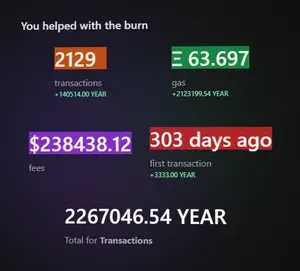Samsung announces its new smart TVs will include an NFT marketplace
If trying to type in the name of a movie on Netflix with a TV remote isn't painful enough for them, now people will be able to try using their TV to do due diligence into whether or not they're about to get scammed.
Crypto gambling service Polymarket shut down and fined $1.4 million by the U.S. CFTC
Although Polymarket was nominally "decentralized", it wasn't so decentralized that the CFTC couldn't fine its New York-based parent company for operating an unregistered market and order them to shut it down. Polymarket previously allowed people to bet cryptocurrency on the outcomes of various events including elections, COVID-19 case spikes, and sports games.
Matt Damon stars in a truly cringeworthy ad for Crypto.com
"Fortune favors the brave", said Matt Damon as he walked past images of mountain climbers, the Wright brothers, and astronauts. "History is filled with 'almosts'. With those who almost adventured, who almost achieved, but ultimately for them it proved to be too much. Then, there are others — the ones who embrace the moment and commit." Evidently the point of the ad was that the "brave" people who "commit" to pouring their money into crypto will make history, and granted that will likely be true, though it is also likely it will not be for the reason Mr. Damon would like you to believe.
Blockchain game CryptoBike apparently rugpulls only days after launch
A Vietnamese play-to-earn game called CryptoBike became popular shortly after its December 25 launch, soaring to around $41.6 million in daily trading volume. However, on January 1, the CryptoBike token CB suddenly plunged in value from $0.81 to $0.019 as 6 million CB were sold, apparently by the project's development team. The team also reportedly blocked people from commenting on the incident in the project's Telegram channel, and took down the project's website.
- "CryptoBike showing signs of scam", Sài Gòn Giải Phóng
- "Dự án game NFT Việt bị nhà đầu tư 'săn lùng' ra cả địa chỉ giả do dùng chiêu cho chiếm đoạt 1,4 tỷ USD rồi bỏ trốn", Diễn đàn Doanh nghiệp
Some of Tinyman's liquidity pools are drained of around $3 million
Tinyman, a defi platform that bills itself as "decentralized, secure trading", had all liquidity drained from its goBTC and goETH pools after an attacker found a bug in their smart contracts. Liquidity throughout Tinyman dropped from about $43 million to around $20 million within hours of the attack, though the platform says they believe that most of this money was withdrawn by its rightful owners and not stolen. Tinyman asked users to remove liquidity from all pools while they work to patch their smart contracts, and announced they would reimburse affected users.
NFT collector loses $38,000 in what he believes is an OpenSea or Rarible glitch
Carson Turner accused ACYCapital of "exploiting @BoredApeYC through a glitch in @rarible" after they bought his Bored Ape NFT that he had listed for sale (and which he has apparently dubbed "Joe RogApe", cringe). Evidently, if a person transfers an NFT that is listed for sale on OpenSea out of their wallet and back again, it appears not to be for sale despite still being available to buyers. Some people have mistakenly thought they could use this "hack" to delist NFTs if they change their mind about selling them, in order to avoid the gas fees associated with canceling a sale. This "glitch" resulted in Turner's Bored Ape #2643 being bought even though he thought it was no longer for sale, and he ended up spending 10 ETH (about $38,000) to get it back. Twitter user lexomis wrote, "On the human side this kinda is a bummer but it isn't a hack or theft or an exploit. It's being your own bank level stuff. To be your own bank requires you to understand a lot of these nuances...." It's hard for me to feel too bad for Turner, though, given he found himself with $1.1 million after "winning the NFT lottery" in August.
Digiconomist reports that Bitcoin consumed about as much energy in 2021 as the whole country of Argentina
Digiconomist released numbers for 2021, showing that during 2021, Bitcoin consumed 134 TWh in total — comparable to the energy consumption of Argentina. The report also claims that Bitcoin was responsible for 0.54% of global electricity consumption, and consumed about 89% more energy in 2021 than in the previous year.
Tether, the stablecoin that claims to be fully backed by actual currency, adds $1 billion to their supply
Shortly after midnight on January 1, Tether added another $1 billion to its total supply. Although Tether claims that all of its supply is fully backed by actual currency, many (including legislators) have cast doubt on the veracity of this claim. Large additions to their supply such as this one, which have become quite a regular occurrence for Tether, raise further eyebrows, with commenters online speaking of them "printing" money. Some speculated that this recent move was an attempt to pump the value of Bitcoin, which had declined over the month of December — starting the month at about $57,000 and ending it about $10,000 lower.
Square Enix CEO acknowledges he will be disappointing gamers who "play to have fun" with his announcement that they are getting into web3
In the announcement, Square Enix CEO Yosuke Matsuda apparently wrote with a straight face: "I realize that some people who 'play to have fun' and who currently form the majority of players have voiced their reservations toward these new trends". He also spoke positively of the metaverse and in the announcement. Square Enix is the maker of popular game franchises including Final Fantasy, Dragon Quest, and Kingdom Hearts.
$YEAR creator rings in the New Year by rugpulling about $225,000
A token called $YEAR invited people to connect their crypto wallets and see a "year in review"-style summary of their 2021 crypto and NFT transactions, with an airdropped token reward based on their activity level. Some community members audited the contract to look for signs of a scam, but missed a few lines of code that enabled the creator to prevent people from selling the token. With people only able to buy the token (on secondary exchanges) but not sell, the price rose, encouraging others to buy in. Only 30 minutes after locking people out of selling, the creator drained the liquidity pool of 59.7 ETH (about $225,000), dropping the coin's value to 0.
- "Airdrop culture could pose integral threat to DeFi industry", Cointelegraph
- "Ethereum Project Airdrops Scam Token, Then Pulls the Rug", Crypto Briefing








